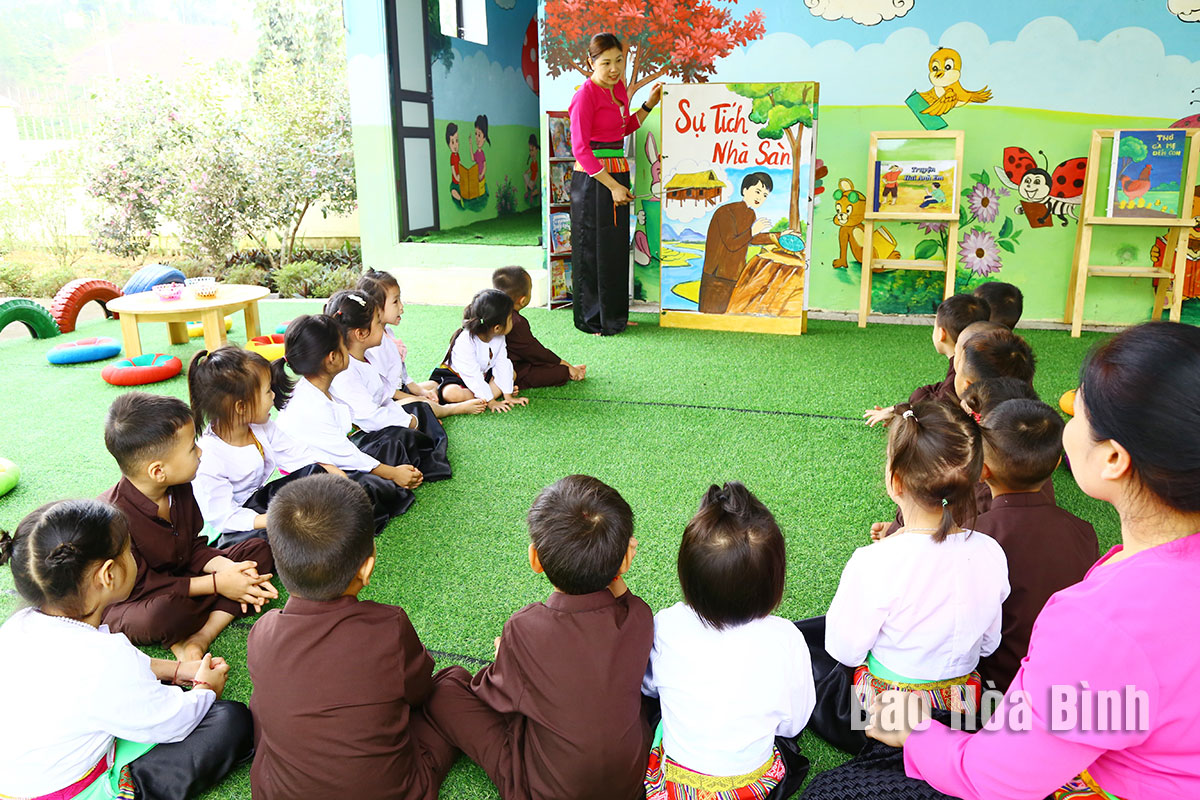
Over the past years, the northern mountainous province of Hoa Binh has kept fostering the holistic development of its citizens, with priority to moral virtue, brainpower, physical fitness, and aesthetics.
Lac Sy commune preschool in Yen Thuy district pays attention to integrating
cultural preservation into educational environment
Educating traditional values for young generation
Attention has been paid to all-round education from early school years. In the
remote Lac Sy commune of Yen Thuy district, Lac Sy preschool has successfully
launched a model on building an educational environment linked with local cultural
preservation. Walking through the school campus, visitors can explore a
traditional cultural corner featuring a stilt house and everyday items of the
Muong people, including looms, traditional attire, and culinary artifacts.
Teachers have curated educational content using large storybooks of folklore,
such as The Legend of the Stilt House, Ong Dung Ba Doang, and De Dat De Nuoc,
which enrich the learning experience for young children. Moreover, play areas
filled with traditional Muong games like bamboo dancing and stilt walking
encourage physical activity while connecting children with their cultural
roots. Every Monday and during festivals, students dress in Muong traditional
attire, with the school achieving 100% participation.
Nguyen
Quang Minh, Deputy Director of the provincial Department of Education and
Training, said these initiatives align with Hoa Binh’s goal of bringing local
history and culture closer to the youth. The local education sector has been
following national guidelines to integrate local cultural education
effectively.
Building a vibrant cultural environment
Alongside
nurturing individuals, Hoa Binh also focuses on creating a vibrant cultural
environment, a responsibility embraced by local authorities as a long-term
mission.
In 2023,
around 88.3% of households were recognised as "Cultural Families,"
and nearly all villages and communities reached the "Cultural
Community" standard. Additionally, about 92.8% of agencies and businesses
met cultural standards. These statistics reflect the commitment to upholding
Hoa Binh's cherished values of love, community spirit, and shared
responsibility for local development.
The
province celebrates key events such as International Day of Happiness (March
20), Vietnamese Family Day (June 28), and the National Action Month for Gender
Equality. Furthermore, regular workshops on family ethics, sustainable family
development clubs, and initiatives against domestic violence help reinforce
community bonds and foster positive values across generations./.
With an increasingly vibrant and widespread emulation movement aimed at building cultured residential areas and cultured families, Yen Thuy District has been making steady progress toward improving both the material and spiritual well-being of its people, while fostering a civilized, prosperous, beautiful, and progressive community.
Once lacking recreational spaces and community facilities, Residential Group 2 in Quynh Lam Ward (Hoa Binh City) has recently received attention for the construction of a new, spacious, and fully equipped cultural house. The project followed the model of state support combined with public contributions in both labor and funding.
The "All people unite to build cultural life" movement, which has been effectively integrated with Kim Boi district’s socio-economic development goals, is fostering a lively spirit of emulation across local residential areas, hamlets, villages, public agencies, and enterprises. In addition, through the initiative, traditional cultural values are being preserved and promoted, while community solidarity and mutual support in poverty reduction and economic development are being strengthened.
A working delegation of the Hoa Binh provincial People’s Committee led by its Permanent Vice Chairman Nguyen Van Toan on June 11 inspected the progress of a project to build the Mo Muong Cultural Heritage Conservation Space linked to tourism services in Hop Phong commune, Cao Phong district.
Born and growing in the heroic land of Muong Dong, Dinh Thi Kieu Dung, a resident in Bo town of Kim Boi district, in her childhood was nurtured by the sweet lullabies of her grandmother and mother. These melodies deeply imprinted on her soul, becoming an inseparable part of her love for her ethnic group's culture. For over 20 years, this love for her hometown has driven Dung to research, collect, and pass down the cultural values of the Muong people to future generations.
In the final days of May, the Ethnic Art Troupe of Hoa Binh Province organized performances to serve the people in remote, mountainous, and particularly disadvantaged areas within the province. These were not just ordinary artistic shows, but they were the meaningful journeys aimed at spreading cultural values, enhancing the spiritual life of the people and contributing to the preservation of ethnic minority cultural identities.



